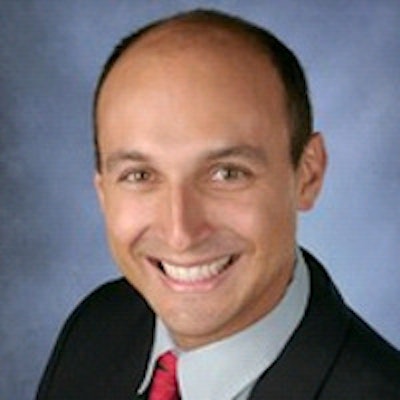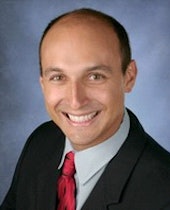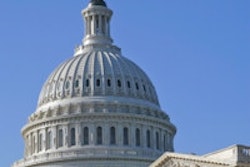
While parents in many parts of the U.S. complain they can't find enough Medicaid dental providers to treat their children, and providers say the reimbursement rates aren't enough to justify taking Medicaid patients, a pediatric dental provider in Washington state believes only half of the eligible children in the area seek treatment.
Pediatric dentist Tyrone Rodriguez, DDS, who owns Selah's Smiles Dental in Selah and SmileSonrisas Dental in Moses Lake, cites several factors.
"People are busy, they work more, and they have other priorities," he said. "The mouth seems to be last on the 'to-do' list in many cases, and some parents are uneducated about the importance of oral health. It's sometimes a question of values."
"Caregivers are just not taking them to the dentist," according to Layne Hansen, chief operating officer for the two dental practices. Both are in small towns outside Yakima in central Washington, where "cows outnumber people," he laughed.
 Tyrone Rodriguez, DDS, owner of Selah's Smiles Dental, SmileSonrisas Dental.
Tyrone Rodriguez, DDS, owner of Selah's Smiles Dental, SmileSonrisas Dental.
The Moses Lake office has been open since 2005; the Selah office just opened in June of this year. The offices, which are 90 miles apart, share four dentists and four hygienists.
Hansen, who has worked in dental practices in the area for 14 years, said he's seen the same thing at other practices: 50% utilization rates for Medicaid-eligible patients. Five other local dental offices also report 50% Medicaid utilization rates, he said.
Children younger than 18 and disabled adults are eligible for Medicaid dental care nationwide. Washington will reinstate adult Medicaid coverage in January, and Hansen expects more patients will come for treatment when that happens.
Hansen said the practices he works for go to great lengths to encourage parents to bring in Medicaid-eligible patients for dental care. Outreach efforts include running ads in newspapers and movie theaters, attending schools and health fairs, and participating in Washington's oral health coalition.
"We do everything to make it known we accept kids and disabled adults on Medicaid," Hansen told DrBicuspid.com. "I can't explain why there's only a 50% utilization rate for kids with Medicaid coverage."
A question of values
People often don't realize that oral health is related to overall health, and that poor oral health can contribute to diabetes, cardiovascular disease, and pregnancy complications, said Dr. Rodriguez, who is the incoming president of the Hispanic Dental Association. Sometimes there are cultural factors, he added.
"In some families, having missing teeth isn't a big deal," he said. In addition, "people put it off because of fear."
Schools should require oral checkups for children, similar to immunization requirements, according to Dr. Rodriguez.
"It's important for parents to understand that dental pain and oral discomfort and airway issues can affect their child's performance in school and their learning, growth, and development," he said. "If they could see how much it can impact their child's health, I think they would take more ownership."
Medicaid challenges
Washington allows expanded-function dental assistants and expanded-function dental hygienists, which Dr. Rodriguez said allows him to provide more care. Hygienists can anesthetize patients and do restorations after he preps teeth.
"It really expands the number of people I can take care of in a very cost-effective way," Dr. Rodriguez said. "Without them, it would be financially impossible to accept the Medicaid population."
The auxiliaries can also handle triages so he can do more difficult procedures.
“People are busy, they work more, and they have other priorities.”
Dr. Rodriguez criticized states that don't allow such dental care auxiliaries, which he believes do need supervision by a dentist.
"The sad truth is that many states' dental-practice acts fragment the delivery of care and create inefficiency and bureaucracy," Dr. Rodriguez said. "A national program of expanded-function auxiliaries would open doors to much greater access."
Medicaid isn't the easiest system to work with, he noted, echoing other dentists' complaints. He had to hire someone just to deal with the paperwork.
Dr. Rodriguez said his offices have a high no-show rate for Medicaid patients.
"Sometimes when things are free, there's no real appreciation," he said. "Even when we provide transportation, we still can't get them in."
To improve the situation, employers could help workers take time off so they can bring their children to the dentist, he added.
'Blaming the victim'
But Frank Catalanotto, DMD, a professor at the University of Florida in the department of community dentistry, disagreed with some of Dr. Rodriguez's assessments.
"There's a certain element of truth and there's a certain element of 'blame the victim,' " he told DrBicuspid.com. "There are patients who don't recognize the importance of baby teeth and oral care, and the potential danger of having an infected tooth in their child and the value of investing in prevention."
Dr. Catalanotto did agree that many people on Medicaid face multiple challenges in taking their children to the dentist, including transportation issues and getting time off from hourly jobs.
He also pointed out that the financially successful Sarrell Dental clinics in Alabama are now the largest single provider of Medicaid dental services, treating 300,000 children annually at their 15 clinics. Sarrell's success comes from a "culture of caring" that includes everyone from the receptionist to dentists to management, he noted.
"If you treat Medicaid patients with respect, you can get very high show rates," he said.



















